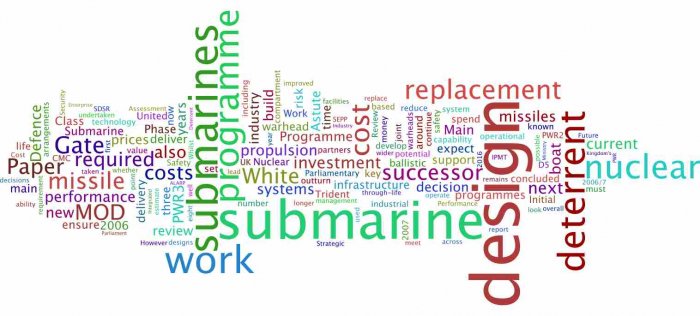Word cloud showing the frequency of words in the Ministry of Defence Initial Gate report.
Defence Secretary Liam Fox has announced that approval has been given to go ahead with the detailed design phase of development of new submarines planned to replace the current Vanguard class vessels which carry the UK's Trident nuclear weapons.
Speaking in Parliament today (18 May 2011), Mr Fox told MPs that the government had decided to give approval to commence design of the new submarines – known as the 'Initial Gate' decision – but that the Cabinet Office will also be undertaking a review into alternatives to replacing Trident. The Ministry of Defence (MoD) has also published a report summarising the progress achieved to date on the replacement programme, and outlining future work which will take place during the assessment phase.
The Initial Gate decision marks the end of the concept phase of the programme, committing the MoD to a firm option for replacement submarines for the Trident nuclear weapons system. The announcement was originally scheduled to be made in Autumn 2009, but has repeatedly slipped back as a result of deliberation over the type of nuclear reactor which will be used to power the new submarines. MoD has decided that the new submarine will have a new third generation pressurised water reactor (PWR3) which, although expected to be an improvement on the safety and reliability of the current generation of Naval nuclear reactor, will add to the costs of the submarine replacement programme. The new reactor design will add £50 Million per boat to the costs of the programme over a 25 year submarine life, although MoD judges that it would be cheaper than other reactor designs over a longer period because of its longer life.
The new submarines will incorporate a number of systems from the Astute Class vessels in their design, and will be designed to be as compatible as possible with existing infrastructure at Faslane and Devonport Naval bases. The design will be based around a 'common missile compartment' which will allow the UK to use the same missile design as US submarines. The costs of developing the compartment will be shared between the two nations.
The Ministry of Defence predicts that the costs of a four boat submarine fleet will remain within the range estimated in its 2006 White Paper on Trident replacement – £11 – 14 billion at 2006-7 prices. However, construction costs for the submarines will have increased to £25 billion at outturn prices by the time the vessels have been built, and no figures are given for the costs of operating or for other elements of the replacement programme such as new missiles or warheads. The report states that further work needs to be done to refine cost estimates”.
Work on the Trident replacement programme will be led by the MoD's 'Tier 1' industrial contractors for its submarine programmes: BAE Systems, Babcock, and Rolls Royce, who effectively have a monopoly in the various aspects of the programme which they are responsible for. MoD hopes to achieve savings in costs through its Submarine Enterprise Performance Programme, which aims to encourage the contractors to deliver the programme to specification, cost, and time.
Around £900 million has been spent on the programme since Parliament voted to replace Trident in 2007, and a further £3 billion will be spent between now and the 'Main Gate' decision on whether to proceed with construction of the new submarines which is scheduled to be taken in 2016. This represents a total of around 15% of total programme expenditure before Parliament will have the opportunity to vote again on Trident after the next election. 'Long lead' expenditure of £380 million will be spent on steel and a propulsion system for the first submarine, and £145 and £6 million will also be spent on propulsion systems for the second and third vessels before the Main Gate decision.
Perhaps significantly, a Cabinet Office study, overseen by Armed Forces Minister Nick Harvey, will also be undertaken to review the costs, feasibility, and credibility of alternative options to Trident. This appears to represent a considerable concession by the Conservatives to the Liberal Democrats, and takes forward the position adopted last year in the Coalition Agreement between the Liberal Democrats and the Conservatives, in which it was stated that the Liberal Democrats would continue to make the case for alternatives to Trident. Terms of reference for the study are expected to be announced next week in a statement by Mr Harvey, and are expected to cover a wide range of options, including a move away from continuous at-sea nuclear patrols by submarines. The study is scheduled to be completed within 18 months and will be available to inform debate during the next General election campaign and at the Main Gate decision point.
The government's decision to proceed with the Trident programme was backed in Parliament by Labour's Shadow Defence Secretary Jim Murphy.
Watch Liam Fox's Parliamentary statement and subsequent questions here (statement starts at 13.00.40):
